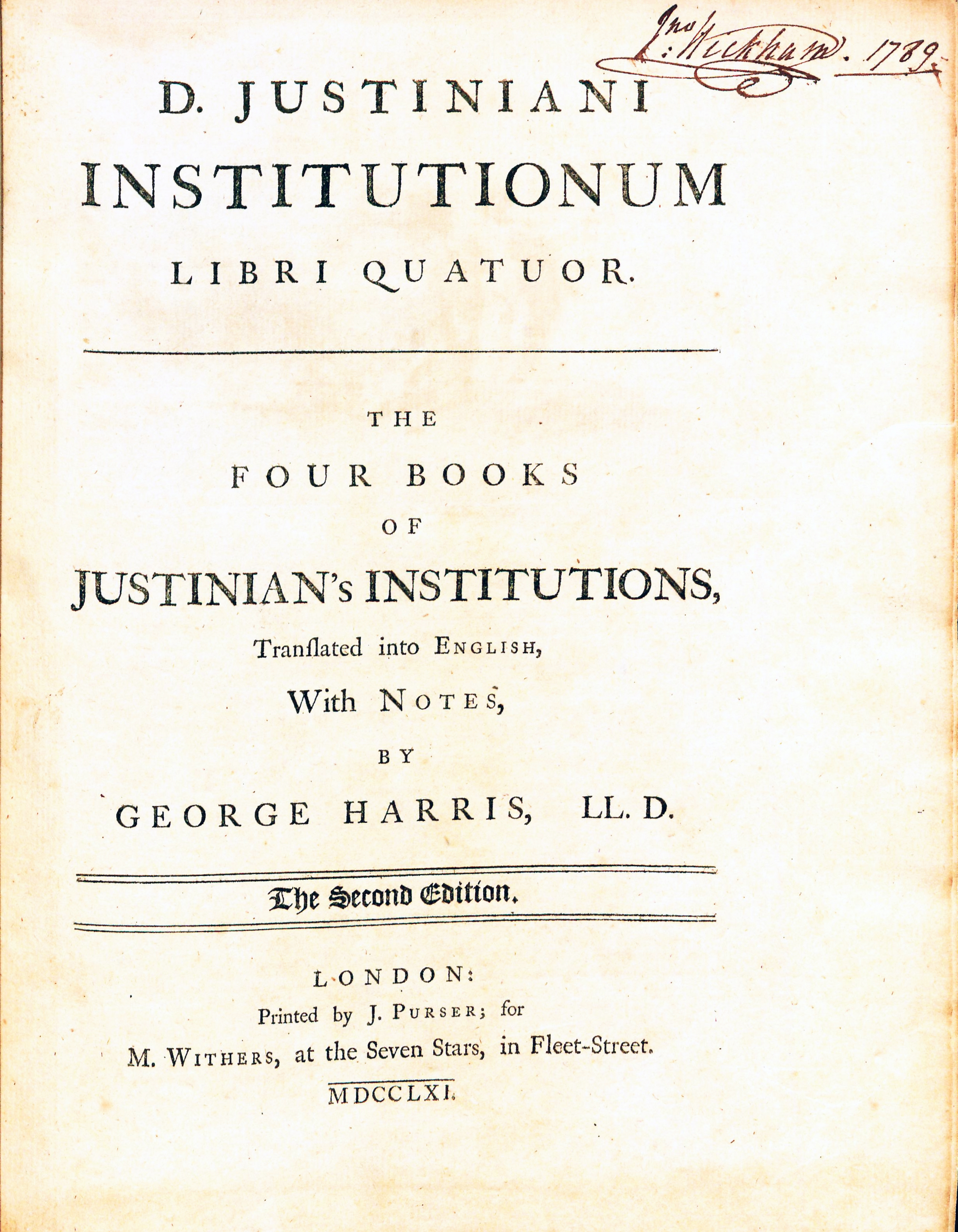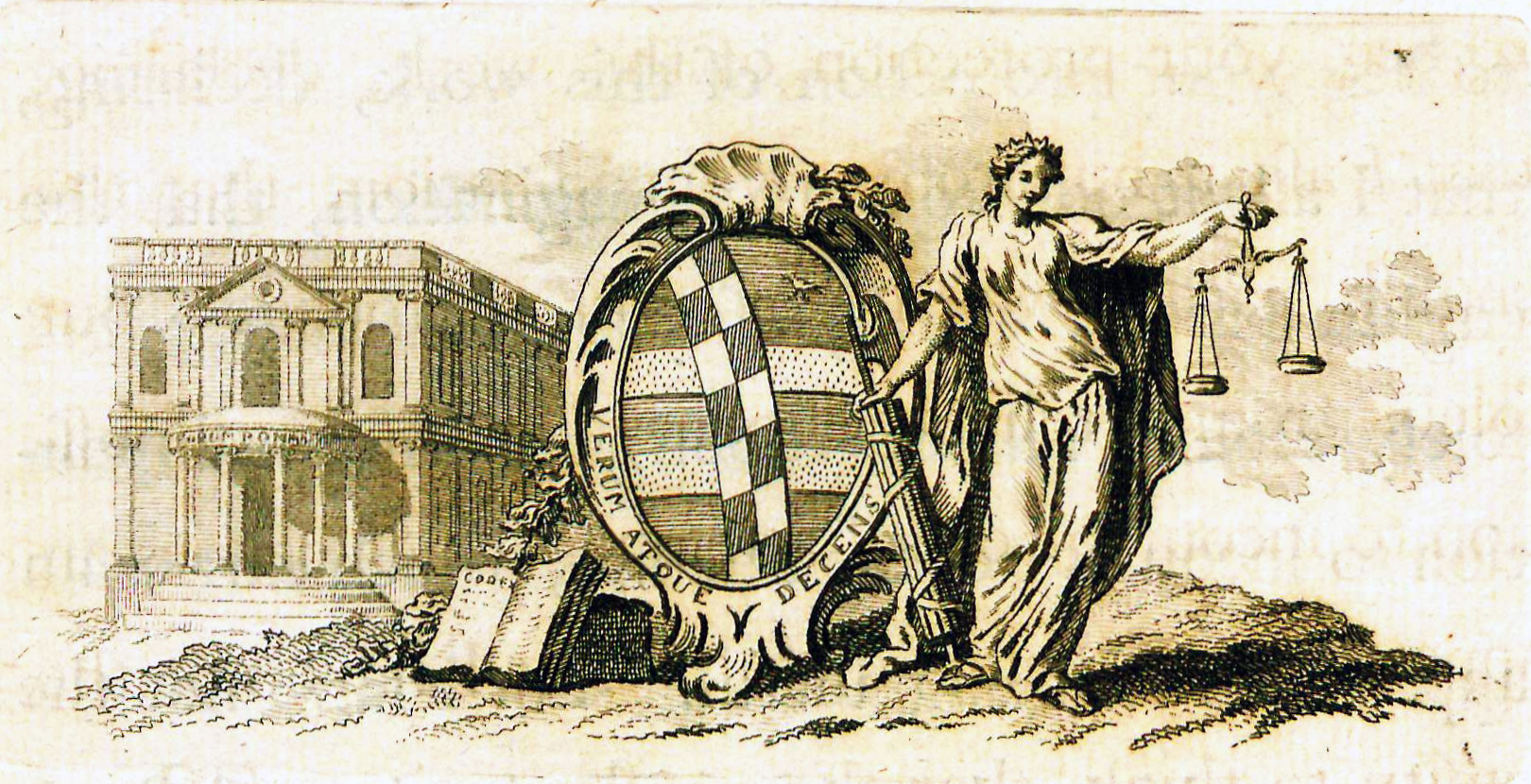Difference between revisions of "Four Books of Justinian's Institutions"
m |
|||
| (25 intermediate revisions by 10 users not shown) | |||
| Line 1: | Line 1: | ||
| − | {{DISPLAYTITLE:''D. Justiniani Institutionum Libri Quator''}} | + | {{DISPLAYTITLE:''D. Justiniani Institutionum Libri Quator, The Four Books of Justinian's Institutions''}} |
| − | ===by === | + | {{BookPageInfoBox |
| − | + | |imagename=DJustinianiInstitutionum1761.jpg | |
| + | |link=https://wm.primo.exlibrisgroup.com/permalink/01COWM_INST/g9pr7p/alma991001406579703196 | ||
| + | |shorttitle=The Four Books of Justinian's Institutions | ||
| + | |commontitle=Justinian's Institutes | ||
| + | |author= | ||
| + | |trans=[[:Category:George Harris|George Harris]] | ||
| + | |publoc=[[:Category:London|London]] | ||
| + | |publisher=Printed by J. Purser for M. Withers | ||
| + | |year=1761 | ||
| + | |edition=Second | ||
| + | |lang=[[:Category:Latin|Latin]] and [[:Category:English|English]] | ||
| + | |pages=iv, 73, 121, 100, 92, [11], [4] | ||
| + | |desc=[[:Category:Quartos|4to]] (27 cm.) | ||
| + | |shelf=G-4 | ||
| + | }}The ''Institutes'' of Justinian is one of the four parts of the ''[[Corpus Juris Civilis]]'', a comprehensive body of Roman Law.<ref>''The Columbia Encyclopedia,'' s.v. "[http://www.credoreference.com/entry/columency/corpus_juris_civilis Corpus Juris Civilis]," accessed March 28, 2014.</ref> Created by order of Emperor Justinian under the guidance of his minister Tribonian, the work is the basis of modern civil law systems.<ref>''Justinian’s Institutes'', trans. with intro. by Peter Birks and Grant McLeod (Ithaca: Cornell University Press, 1987), 8.</ref> The ''Institutes'' serves as an introduction to the law, a way for students unfamiliar with the law to build a legal framework by organizing the law into a three part scheme: the law of people, things, and actions. <ref>Ibid., 12-13.</ref> Unlike Justinian's ''Digest'', "each title appears to be a single, continuous essay."<ref>Ibid., 12.</ref> The emphasis is on avoidance of confusion, ease of use, and the development of basic knowledge necessary to analyze more complex portions of the law.<ref>Ibid., 15-16.</ref> In Justinian’s own words, it is a "cunabula legume" or cradle of the law.<ref>Ibid., 15.</ref> | ||
| + | |||
| + | [[File:DJustinianiInstitutionumLibriQuator1761Illustration.jpg|left|thumb|400px|<center>Illustration, dedication.</center>]] | ||
| + | Tribonian did not create the ''Institutes'' from scratch.<ref>Ibid., 12.</ref> Scholars posit that he polished and edited the drafts of two law professors in making the final version.<ref>Ibid.</ref> In addition, Tribonian relied heavily on older Roman law sources, especially the ''Institutes'' of Gaius.<ref>Ibid., 16.</ref> | ||
| + | |||
| + | This volume, ''D. Justiniani Institutionum Libri Quator, The Four Books of Justinian's Institutions,'' is a translation with commentary by George Harris (bap. 1721, d. 1796). Harris, a lawyer educated at Oriel College, Oxford, first published his version of the ''Institutes'' in 1756.<ref>T. A. B. Corley, "[http://www.oxforddnb.com/view/article/12386 Harris, George (bap. 1721, d. 1796)]," ''Oxford Dictionary of National Biography'' (Oxford University Press, 2004- ), accessed March 28, 2014.</ref> He intended his work to be "an introduction to [[Institutionum Imperialium Commentarius|Vinny's Edition]]."<ref>''The Four Books of Justinian's Institutions'', trans. with notes George Harris (London: 1756), viii.</ref> | ||
| + | |||
| + | ==Evidence for Inclusion in Wythe's Library== | ||
| + | |||
| + | Listed in the [[Jefferson Inventory]] of [[Wythe's Library]] as "[H]arris's Justinian. 4to." and given by [[Thomas Jefferson]] to [[James Dinsmore]]. Brown's Bibliography<ref>Bennie Brown, "The Library of George Wythe of Williamsburg and Richmond," (unpublished manuscript, May, 2012) Microsoft Word file. Earlier edition available at: https://digitalarchive.wm.edu/handle/10288/13433.</ref> suggests either the first (1756) or the second (1761) edition, noting that Jefferson sold a copy of the latter to the Library of Congress.<ref>E. Millicent Sowerby, ''Catalogue of the Library of Thomas Jefferson'', (Washington, D.C.: The Library of Congress, 1952-1959), 2:397 [http://babel.hathitrust.org/cgi/pt?id=mdp.39015033648109;view=1up;seq=415 [no.2191]].</ref> [http://www.librarything.com/profile/GeorgeWythe George Wythe's Library]<ref>''LibraryThing'', s.v. "[http://www.librarything.com/profile/GeorgeWythe Member: George Wythe]," accessed on June 28, 2013.</ref> on LibraryThing indicates "Precise edition unknown. Editions with similar imprints were published at London in 1756 and 1761" and also mentions Jefferson's copy at the Library of Congress. The Wolf Law Library purchased a copy of the second edition. | ||
| + | |||
| + | ==Description of the Wolf Law Library's copy== | ||
| − | + | Bound in contemporary full calf, rebacked in period style. Title page signed "J. Wickham 1789." Purchased from The Lawbook Exchange, Ltd. | |
| − | |||
| − | ''' | + | This copy belonged to the notable Virginia jurist [http://en.wikipedia.org/wiki/John_Wickham_%28attorney%29 John Wickham] (1763-1839), lead defense counsel in Aaron Burr's treason trial. Wickham studied law at the College of William & Mary and began practicing in Williamsburg in 1785. A longtime friend of John Marshall, Wickham was a loyalist during the Revolution.<ref>''Encyclopedia of Virginia Biography'', ed. Lyon Gardiner Tyler (New York: Lewis Historical Publishing Company, 1915), 2:181-182.</ref> |
| − | ' | + | Images of the library's copy of this book are [https://www.flickr.com/photos/wolflawlibrary/albums/72157637448496426 available on Flickr.] View the record for this book in [https://wm.primo.exlibrisgroup.com/permalink/01COWM_INST/g9pr7p/alma991001406579703196 William & Mary's online catalog.] |
| − | + | ==See also== | |
| − | + | *''[[Institutionum Imperialium Commentarius|''Arnoldi Vinnii JC. in Quatuor Libros Institutionum Imperialium Commentarius: Academicus & Forensis]]'' | |
| + | *''[[Codex Justinianus|Codex Justinianus ad Vetustorum Exemplarium Fidem Diligẽtissime Recognitus]]'' | ||
| + | *''[[Corpus Juris Civilis]]'' | ||
| + | *[[George Wythe Room]] | ||
| + | *[[Jefferson Inventory]] | ||
| + | *[[Wythe's Library]] | ||
| − | == | + | ==References== |
| − | + | <references/> | |
==External Links== | ==External Links== | ||
| − | |||
| − | = | + | *Read this book in [http://books.google.com/books?id=uoNIAAAAYAAJ Google Books.] |
| − | |||
| + | __NOTOC__ | ||
| + | [[Category:George Harris]] | ||
[[Category:George Wythe Collection at William & Mary's Wolf Law Library]] | [[Category:George Wythe Collection at William & Mary's Wolf Law Library]] | ||
| + | [[Category:James Dinsmore's Books]] | ||
[[Category:Roman Law]] | [[Category:Roman Law]] | ||
[[Category:Titles in Wythe's Library]] | [[Category:Titles in Wythe's Library]] | ||
| + | |||
| + | [[Category:English]] | ||
| + | [[Category:Latin]] | ||
| + | [[Category:London]] | ||
| + | [[Category:Quartos]] | ||
Latest revision as of 13:00, 4 October 2021
| Justinian's Institutes | |
|
Title page from The Four Books of Justinian's Institutions, George Wythe Collection, Wolf Law Library, College of William & Mary. | |
| Translator | George Harris |
| Published | London: Printed by J. Purser for M. Withers |
| Date | 1761 |
| Edition | Second |
| Language | Latin and English |
| Pages | iv, 73, 121, 100, 92, [11], [4] |
| Desc. | 4to (27 cm.) |
| Location | Shelf G-4 |
The Institutes of Justinian is one of the four parts of the Corpus Juris Civilis, a comprehensive body of Roman Law.[1] Created by order of Emperor Justinian under the guidance of his minister Tribonian, the work is the basis of modern civil law systems.[2] The Institutes serves as an introduction to the law, a way for students unfamiliar with the law to build a legal framework by organizing the law into a three part scheme: the law of people, things, and actions. [3] Unlike Justinian's Digest, "each title appears to be a single, continuous essay."[4] The emphasis is on avoidance of confusion, ease of use, and the development of basic knowledge necessary to analyze more complex portions of the law.[5] In Justinian’s own words, it is a "cunabula legume" or cradle of the law.[6]
Tribonian did not create the Institutes from scratch.[7] Scholars posit that he polished and edited the drafts of two law professors in making the final version.[8] In addition, Tribonian relied heavily on older Roman law sources, especially the Institutes of Gaius.[9]
This volume, D. Justiniani Institutionum Libri Quator, The Four Books of Justinian's Institutions, is a translation with commentary by George Harris (bap. 1721, d. 1796). Harris, a lawyer educated at Oriel College, Oxford, first published his version of the Institutes in 1756.[10] He intended his work to be "an introduction to Vinny's Edition."[11]
Evidence for Inclusion in Wythe's Library
Listed in the Jefferson Inventory of Wythe's Library as "[H]arris's Justinian. 4to." and given by Thomas Jefferson to James Dinsmore. Brown's Bibliography[12] suggests either the first (1756) or the second (1761) edition, noting that Jefferson sold a copy of the latter to the Library of Congress.[13] George Wythe's Library[14] on LibraryThing indicates "Precise edition unknown. Editions with similar imprints were published at London in 1756 and 1761" and also mentions Jefferson's copy at the Library of Congress. The Wolf Law Library purchased a copy of the second edition.
Description of the Wolf Law Library's copy
Bound in contemporary full calf, rebacked in period style. Title page signed "J. Wickham 1789." Purchased from The Lawbook Exchange, Ltd.
This copy belonged to the notable Virginia jurist John Wickham (1763-1839), lead defense counsel in Aaron Burr's treason trial. Wickham studied law at the College of William & Mary and began practicing in Williamsburg in 1785. A longtime friend of John Marshall, Wickham was a loyalist during the Revolution.[15]
Images of the library's copy of this book are available on Flickr. View the record for this book in William & Mary's online catalog.
See also
- Arnoldi Vinnii JC. in Quatuor Libros Institutionum Imperialium Commentarius: Academicus & Forensis
- Codex Justinianus ad Vetustorum Exemplarium Fidem Diligẽtissime Recognitus
- Corpus Juris Civilis
- George Wythe Room
- Jefferson Inventory
- Wythe's Library
References
- ↑ The Columbia Encyclopedia, s.v. "Corpus Juris Civilis," accessed March 28, 2014.
- ↑ Justinian’s Institutes, trans. with intro. by Peter Birks and Grant McLeod (Ithaca: Cornell University Press, 1987), 8.
- ↑ Ibid., 12-13.
- ↑ Ibid., 12.
- ↑ Ibid., 15-16.
- ↑ Ibid., 15.
- ↑ Ibid., 12.
- ↑ Ibid.
- ↑ Ibid., 16.
- ↑ T. A. B. Corley, "Harris, George (bap. 1721, d. 1796)," Oxford Dictionary of National Biography (Oxford University Press, 2004- ), accessed March 28, 2014.
- ↑ The Four Books of Justinian's Institutions, trans. with notes George Harris (London: 1756), viii.
- ↑ Bennie Brown, "The Library of George Wythe of Williamsburg and Richmond," (unpublished manuscript, May, 2012) Microsoft Word file. Earlier edition available at: https://digitalarchive.wm.edu/handle/10288/13433.
- ↑ E. Millicent Sowerby, Catalogue of the Library of Thomas Jefferson, (Washington, D.C.: The Library of Congress, 1952-1959), 2:397 [no.2191].
- ↑ LibraryThing, s.v. "Member: George Wythe," accessed on June 28, 2013.
- ↑ Encyclopedia of Virginia Biography, ed. Lyon Gardiner Tyler (New York: Lewis Historical Publishing Company, 1915), 2:181-182.
External Links
- Read this book in Google Books.

